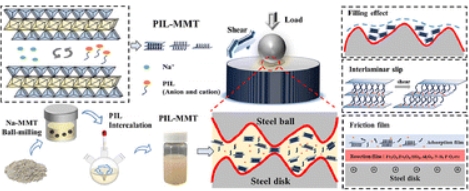Abstract
Two-dimensional (2D) nanomaterials have attracted much attention for the lubrication enhancement of water. Stably dispersing nanosheets in water for an extended period is a challenging task. 2D montmorillonite (MMT) nanosheets are modified with protonic ionic liquids (PILs) with the assistance of simple and efficient mechanochemical synthesis, which can stably disperse in water. With the help of TEM, FTIR, and XPS characterization, it is further demonstrated that the one-step mechanochemical stirring synthesis method can introduce the anions and cations of PILs into the MMT interlayer simultaneously, which gives the binary-modified MMT nanosheets some of the advantages of PILs, such as designability and functionalization. The successful intercalation and grafting of ionic liquids between the MMT nanosheets made it possible to obtain ultra-thin thickness and micro-nano size of the binary MMT nanosheets, and the synergistic effect of the 2D MMT nanosheets and the PIL laid a good foundation for the realization of the excellent lubricity, the easy-sliding interlayer structure, and the adsorption of the film more easily. Using the modified MMT nanosheets, the coefficient of friction and wear volume can be reduced by 76% and 94% at a high frequency and high load, respectively. The successful intercalation of PILs endows the MMT nanomaterial with better thermal stability and extreme pressure properties, with the maximum bite-free load (PB) being nearly 17 times higher than water. The friction mechanism shows that the enhancement of the lubrication and anti-wear performance is attributed to the boundary adsorbed tribofilm of MMT nanosheets achieving a repairing effect of the friction interfaces, which provides effective lubrication for steel/steel contact, thus preventing further wear of the friction pair surface. This work provides green, economical guidance for developing natural water-based lubricant additives and has great potential in sustainable lubrication.

Published in NANOSCALE,Volume17;10.1039/d4nr03890h,JAN 2 2025


